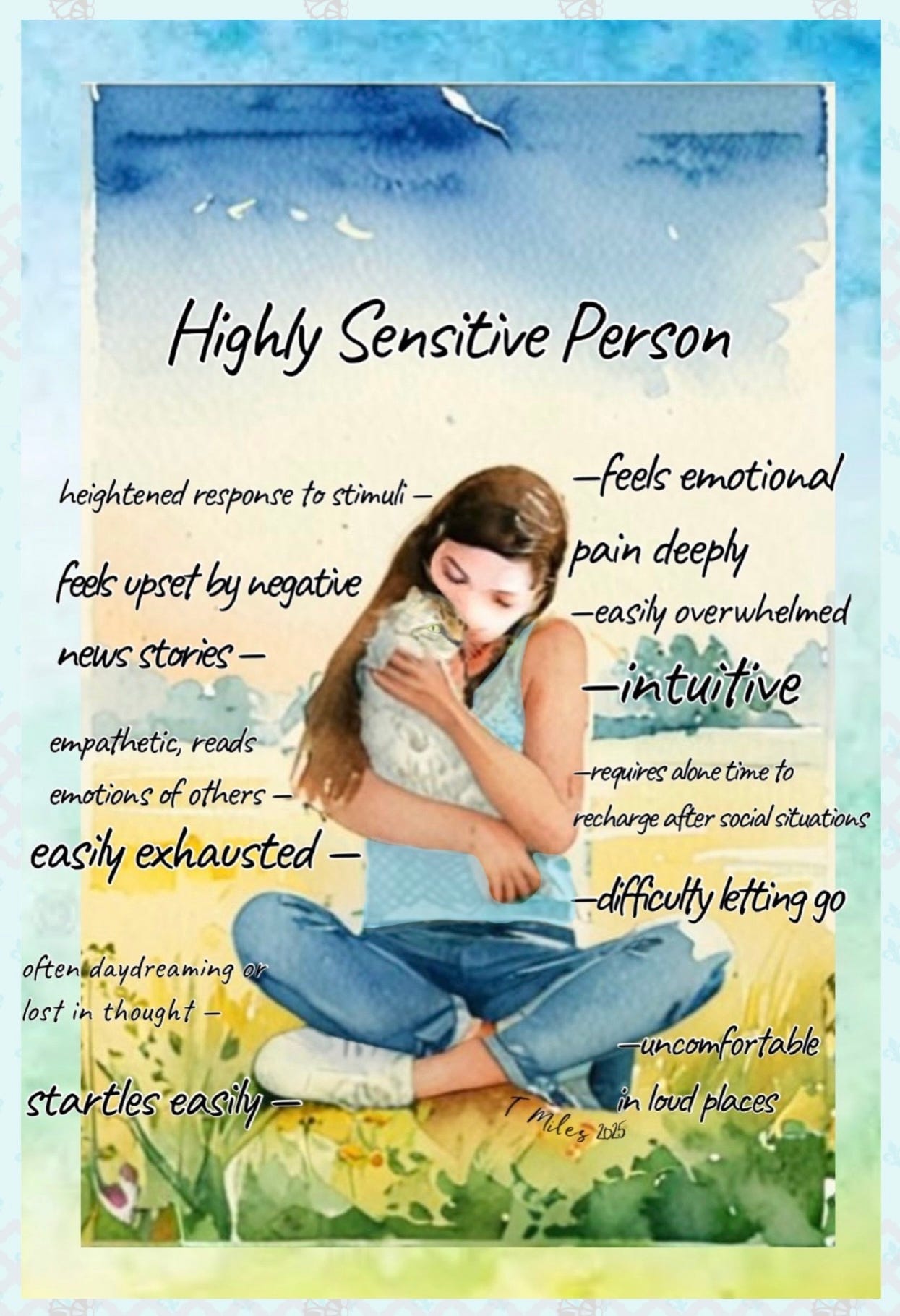Life as an HSP
As a highly sensitive person (HSP), I feel emotions intensely. While heightened sensitivity is often misunderstood, it’s actually a strength. At times, I might even describe it as having a sixth sense due to my strong intuition. But I didn’t always see it that way.
As a kid, I was often told I was “too sensitive.” Hearing it phrased that way made me believe I was weak or even abnormal. Now, I’ve come to view my sensitivity in a more positive light—but that doesn’t mean it isn’t challenging. The world often feels too loud, too fast, and too overwhelming.
Heightened awareness of our surroundings is another trait of highly sensitive people. This instinct exists to protect us from potential danger, which, when you think about it, is an advantage. When humans lived in caves, constantly facing threats, this heightened awareness was crucial for survival. But as we’ve evolved, most people no longer rely on this instinct as a priority. I’m no scientist, so I can’t explain why, but those of us with heightened sensitivity are still wired to have strong reactions in anxiety-inducing situations.
You’ve probably heard of the fight-or-flight response, but there are two more: freeze and fawn. I freeze. I don’t literally lie down and play dead—though that’s probably how I would have reacted as an early human. Instead, I lose the ability to do anything. I struggle to collect my thoughts, speak, or even process what I’m hearing. If the anxiety is severe enough, my vision darkens and blurs. It’s not fun. Even mild anxiety can leave me feeling completely drained.
The flip side? This sensitivity allows for deep empathy, creativity, and intuition. Understanding how to navigate the world as an HSP is essential for maintaining my well-being and learning to embrace the strengths that come with it.
Understanding High Sensitivity
Highly sensitive people are not flawed. Our brains are simply wired differently—similar to the difference between being left- or right-handed. HSPs may experience heightened emotional responses, sensitivity to subtle changes, and intense reactions to sensory stimuli such as sounds, light, and textures.
Recognizing what triggers overstimulation is key. Learning to identify these characteristics will help you find ways to navigate life more comfortably.
Challenges of Being Highly Sensitive
Some situations are particularly challenging for me—especially social gatherings, large groups, and chaotic environments. The more overwhelming the setting, the more anxious and overstimulated I feel.
Sensory overload can be triggered by crowded places, bright or flashing lights, loud noises, or certain smells. Driving can also be incredibly stressful, especially in unfamiliar areas. Navigating new streets while processing traffic, road signs, and GPS directions can quickly become overwhelming. If my anxiety is severe enough, I struggle to process what the GPS is saying, which can lead to wrong turns—causing the GPS to talk even more, further increasing my stress. Sometimes, I have to pull over just to focus on my breathing before I can continue. If I’m running late, it only amplifies the anxiety.
I also have emetophobia, which causes intense physical reactions if I see, hear, or even smell vomit. I become dizzy, weak, experience tunnel vision, and temporarily lose my hearing. As a child, these episodes were especially terrifying.
Another challenge is absorbing the emotions of those around me, particularly when they are negative. My mother, for example, carries a lot of unresolved (and unacknowledged) anger, and I often feel agitated in her presence. Now that I recognize what’s happening, it’s easier to manage, but for years, I struggled to separate my own emotions from those I absorbed from others.
Strategies for Thriving as an HSP
1. Create a Sensory-Friendly Environment
Though it’s not always possible to control my surroundings, there are ways to reduce overstimulation. Soft lighting, quiet spaces, and calming sounds—like rain or soft piano music—help me recharge after social exhaustion. Ludovico Einaudi’s music, in particular, is very soothing.
I’ve heard noise-canceling headphones are great, though I haven’t personally tried them. However, I’ve noticed that limiting exposure to overstimulating environments makes it easier to handle everyday sensory input.
2. Set Boundaries Without Guilt
Setting boundaries is crucial for emotional well-being, but many HSPs (myself included) are natural people-pleasers. I’ve learned that saying no to draining situations is necessary for self-care.
Logically, I know that prioritizing my well-being isn’t selfish—but I still struggle with guilt and the feeling that I’m letting people down.
3. Schedule Downtime
Alone time is just as essential for my mental health and energy levels as food and sleep are for my physical well-being. Engaging in calming activities—reading, writing, drawing, or spending time in nature—helps me process emotions and recharge.
4. Practice Mindfulness and Grounding Techniques
Breathing exercises, guided meditation, and muscle relaxation can be helpful for staying present. There are plenty of mindfulness podcasts on Spotify that I find useful.
A therapist once taught me a grounding technique for bringing my thoughts back to the present. It involves listing:
• 5 things you see (e.g., a bird outside, a ceiling light)
• 5 things you hear (e.g., a dog barking, a TV in another room)
• 5 things you feel (e.g., your heartbeat, your feet on the floor)
Then, you repeat the exercise with 4 things, then 3, 2, and finally 1. Ideally, by the end, you’ll feel more centered (or even fall asleep if you’re using it for insomnia).
Another helpful technique is counting backward from 300 by threes—it requires just enough focus to quiet anxious thoughts.
5. Surround Yourself with Understanding People
Therapists often say to surround yourself with supportive people—but this can be tricky. My friends are kind, but few truly understand what I experience, despite my attempts to explain. It’s frustrating to feel like I have to repeatedly justify my needs.
Since stepping back from certain relationships, I only have two friends who reach out regularly. I don’t blame the others—life is busy—but I still struggle with guilt over distancing myself. I remind myself that it’s okay to take time for myself when needed.
Finding neurodivergent and highly sensitive people through Substack has helped. Connecting with others who share similar experiences makes me feel less alone—like I’m not some kind of weirdo.
6. Reframe Sensitivity as a Strength
Society often equates sensitivity with weakness, but in reality, HSPs bring depth, compassion, and creativity to the world. Embracing these qualities allows for a more fulfilling life.
Embracing Life as an HSP
Being highly sensitive isn’t something to fix—it’s something to understand and work with. While the world may not always accommodate high sensitivity, learning to navigate it with self-awareness and self-compassion makes a big difference. By honoring personal needs, setting boundaries, and finding ways to recharge, HSPs can turn their sensitivity into a powerful tool for connection, creativity, and meaningful living.🩵






